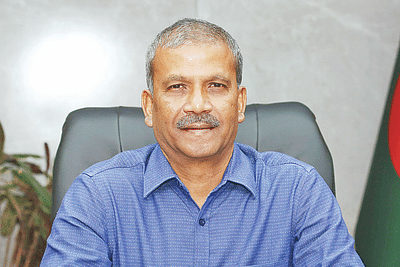The continuous 15-and-a-half-year rule of the Awami League government came to an end on August 5, following a student and public uprising. On August 8, an interim government was formed under the leadership of Dr. Muhammad Yunus. Professor Asif Nazrul, from the Department of Law at Dhaka University, has been appointed as an advisor to this government, overseeing the Ministry of Law, Justice and Parliamentary Affairs, the Ministry of Expatriates’ Welfare and Overseas Employment, and the Ministry of Culture.
On the occasion of the government’s one-month anniversary, Asif Nazrul spoke to *Prothom Alo* about the activities of the advisory council, reforms, the duration of the government’s term, relations with India, and other topics. The interview was conducted yesterday, Saturday, at the Ministry of Expatriates’ Welfare in Eskaton, Dhaka, by *Prothom Alo*’s Deputy Head of Reporting, Rajib Ahmed.
Prothom Alo: You were previously a member of civil society, a critic of the government on issues such as human rights, freedom of speech, rule of law, politics, and the judiciary. Now, you are part of the government. What can you say about your new experience?
Asif Nazrul: I’ve been criticizing different governments for 30 years, but now I’ve been in the government for 30 days. It’s far more challenging to take on these responsibilities than it was to critique negative government actions. I had no prior experience. However, I believe that with sincerity, patriotism, and willpower, anything is possible. I’m confident that within one to two months, I’ll be able to perform my duties comfortably. Another issue is that the previous government, over the last 15 years, destroyed institutions and fostered rampant corruption and partisanship. This has created a very difficult situation where working effectively is extremely challenging.
Prothom Alo: It’s been one month since this government took office. Which of its actions would you consider positive? What incidents do you see as unfortunate?
Asif Nazrul: I believe the first good thing this government has done is to instill confidence that it is a people’s government. The previous government acted like a master over the people. We’ve managed to give the public, even if just a little, the idea that this is their government, here to serve them. People can criticize this government whenever they want. We’ve created an atmosphere of freedom.
There have been efforts to reduce discrimination and injustice, although this may not be obvious from the outside. For example, some government officials were promoted or held back for political reasons, and actions have been taken to rectify this. The government has reassured people that the July killings will be brought to justice. False cases filed during the student movement by the previous government have been withdrawn, and some false cases under the Digital Security Act have also been dismissed.
In the economic sphere, steps have been taken to bring discipline, hold loan defaulters accountable, and recover laundered assets. We’ve been able to give people a little hope again. Seminars and gatherings are being held in the capital; people are speaking up, and various proposals are being put forward. This is the kind of country we wanted, and now, after so many years, we finally have it.
In terms of human rights, significant work has been done to align with international standards, and the UN convention on enforced disappearances has been signed. A commission on disappearances has also been formed.
One thing that’s not visible from the outside is the effort to destabilize this government. Attempts have been made to create instability through judicial coups, Ansar, and labor unrest, but these have been countered. Still, some unfortunate incidents have occurred, such as the indiscriminate filing of cases and the blanket accusations in those cases, reminiscent of the previous government. There have also been attacks in the court premises.
Prothom Alo: There’s criticism about the indiscriminate filing of cases and blanket accusations. What steps is the government taking?
Asif Nazrul: We’ve found that law enforcement has been forced to accept these cases. During the previous government, both the courts and the police were turned into adversaries of the people, becoming objects of hatred. As a result, they lack the moral strength to stand up to pressure. Even if they don’t want to, they’re still having to accept these blanket accusations. Despite good intentions, the police have failed to prevent attacks in court premises. We’re trying to find ways to address this, like proposing that hearings for certain key figures take place early in the morning or at unpredictable times, which has helped curb some of the attacks.
For the cases, one idea is to conduct a preliminary investigation before registering an FIR (First Information Report). We’re also considering changes to the criminal procedure code. Moreover, the government has sent a clear message that registering an FIR doesn’t automatically mean arrest.
Prothom Alo: So, can we say that the government acknowledges the problem of blanket accusations and is taking steps to address it?
Asif Nazrul: Absolutely. The government is taking measures. However, I must emphasize that this problem originated with the previous government, which created a culture of fabricated cases. In some areas, retaliatory actions are happening. We can’t eliminate everyone’s grievances overnight.
Prothom Alo: Let’s go back to your role as an advisor. You chose the Ministry of Law. Why?
Asif Nazrul: I believe I understand legal issues better than other subjects. Through the Ministry of Law, we can correct many injustices. At least 50% of the judges are either my former students or people I know. These factors motivated me to take on the responsibility of the law ministry. When Dr. Yunus asked me to take on this role, I agreed with interest. However, the Ministry of Expatriates’ Welfare has posed a challenge for me. I used to talk to Dr. Yunus about the hardships faced by migrant workers whenever we traveled abroad. He may have remembered that and given me this ministry. I want to work for expatriates, but as you can see, I’ve been working on Saturdays—this is my third Saturday in 30 days. I’ve also had to work on two Fridays in the past month.
Prothom Alo: The people’s uprising brought forward desires for human rights, justice, rule of law, freedom of speech, and voting rights, much of which is linked to the work of the Ministry of Law. It’s a lot of work. How confident are you about completing these tasks?
Asif Nazrul: The withdrawal of politically motivated cases, releasing innocent people arrested during the protests, freeing the attorney general’s office from the previous government’s influence, reinstating discriminated officials, and assisting with various appointments—these routine tasks have taken up much of the past month. I’ve also had to work on other ministries’ issues. Moreover, there have been many tasks that a regular government wouldn’t have to deal with. Therefore, I haven’t been able to dedicate time to reforms yet. However, by December, we will start visible reform processes.
Prothom Alo: There’s talk of prosecuting former Prime Minister Sheikh Hasina and the Awami League as a party for crimes in international tribunals. Are you still pursuing this, or is there a new approach?
Asif Nazrul: Victims and their families are filing cases under existing laws. We cannot stop them; we don’t have that right. However, given the scale of the July killings, the best course for justice is to try these cases in the International Crimes Tribunal under the 1973 law. We’ve consulted with local and international experts, and this law offers the best opportunity and potential for prosecuting the masterminds behind the July genocide. We’ve also been able to convince foreign diplomats and UN representatives of this. They have some concerns, such as issues with the law’s definitions, witness procedures, and limitations on the legal recourse for the accused. We plan to address these through amendments to the law. Our aim is not revenge but to ensure justice for genocide.
Foreign representatives have said that since the law includes the death penalty, they cannot participate directly in the judicial process. We’ve told them that we will amend the law to allow them to observe the proceedings. Accused individuals will also be able to hire foreign lawyers.
Prothom Alo: Will the provision for the death penalty remain in the International Crimes Tribunal Act?
Asif Nazrul: This is a significant policy issue, and we cannot change it hastily. We need to assess whether Bangladesh has the necessary corrective penal system and public culture to abolish the death penalty.
Prothom Alo: The government’s chief advisor, Dr. Muhammad Yunus, told India’s PTI news agency that former Prime Minister Sheikh Hasina will face trial, and there will be a request for her extradition from India. Can you elaborate?
Asif Nazrul: Sheikh Hasina was the mastermind and planner behind the July genocide. There will be a trial for the killings, and naturally, the question of executing the trial’s outcome will arise. This will lead to a request for extradition from India. The chief advisor’s words reflect the desires of the people.
Prothom Alo: Does Bangladesh have a prisoner exchange agreement with India?
Asif Nazrul: Yes, but in crucial cases, exceptions can be made to certain conditions of the agreement. We will discuss this with India to ensure that doesn’t happen.
Prothom Alo: We’ve heard a statement from India’s Defense Minister Rajnath Singh about preparing the Indian military for future conflicts. Does the Bangladesh government have any reaction to this?
Asif Nazrul: There has been no discussion at the government level on this. In my personal opinion, India should understand that Bangladesh is now governed by a government formed through the revolution of students and citizens. This government has massive public support, dignity, and patriotism. Rajnath Singh’s mention of Ukraine, Palestine, and Bangladesh together seemed to show a lack of sensitivity and respect toward the changes in Bangladesh. India’s policies toward neighboring countries are failing. I would urge India to reflect on its own responsibilities in this regard. Bangladesh will maintain its relationship with India, but it will be based on mutual respect.
Prothom Alo: The coordinators of the anti-discrimination student movement are now part of the government, which is a new chapter. What’s your experience working with them?
Asif Nazrul: It’s been a wonderful experience. I’m impressed by their work, the way they speak in the advisory council, and how they carry out their responsibilities. I believe they will perform exceptionally well in the future
. I’ve learned much from working with them. As they continue to progress, I hope to learn even more.
Prothom Alo: Thank you, Professor Asif Nazrul, for sharing your insights and reflections on these critical issues.
Asif Nazrul: Thank you for the conversation.










